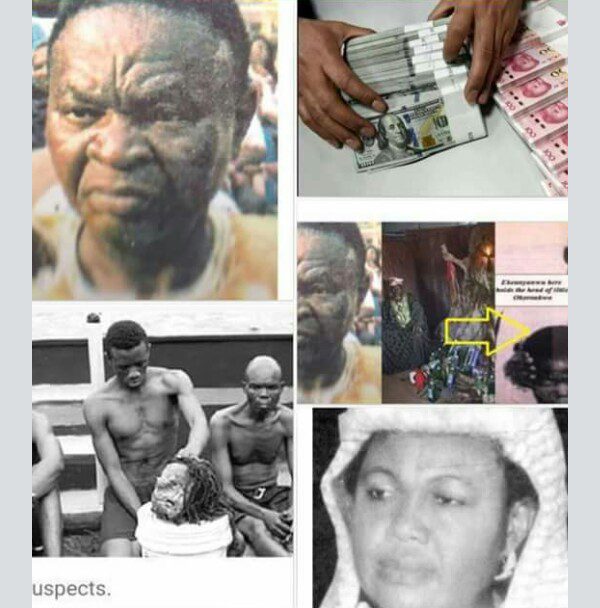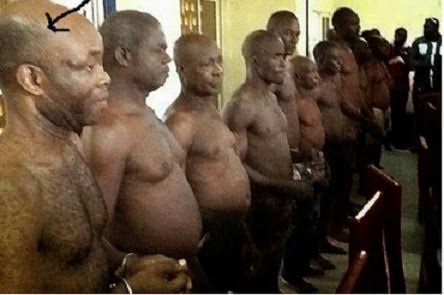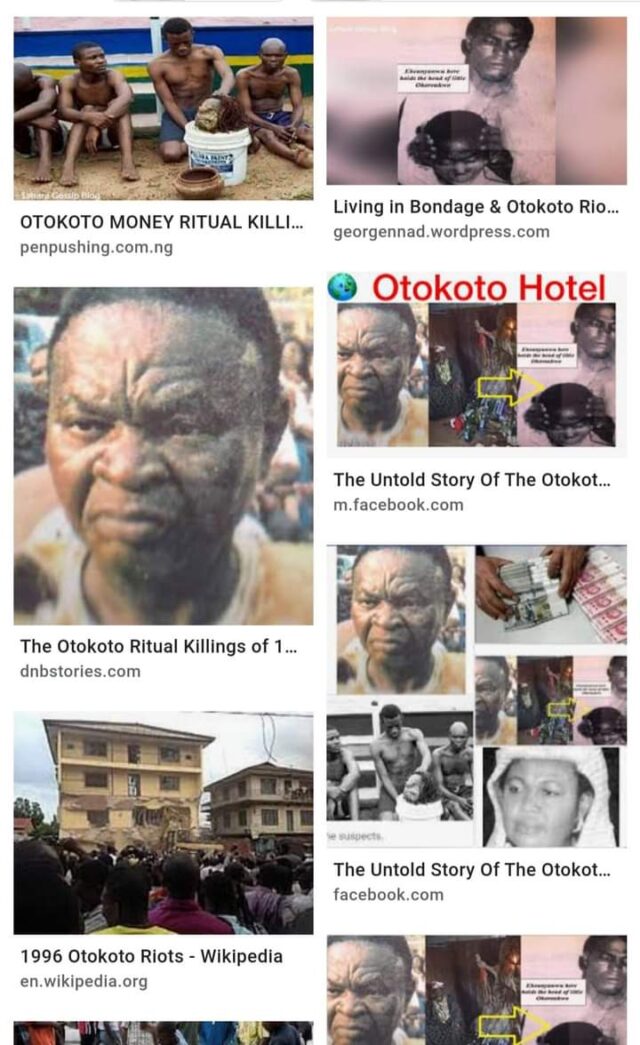Forgotten Dairies
Remembering Otokoto uprising -By Chidi Nkwopara
Ekeanyanwu decapitated the boy’s head, ripped open his abdomen, harvested his liver, and cropped off the tip of his penis. That was not all. The same ritualist carefully selected his victim’s other vital organs, which he needed and carefully stacked them in a polythene carrier bag, buried the remains of the boy in a shallow grave, within the hotel premises, washed the room thoroughly, before leaving to deliver his “priced product”, Ikechukwu’s head, to his ally!

September 19, 1996, will remain evergreen in the minds of most Imo citizens, and indeed, many Nigerians. It was the day Imo people massively revolted against criminals operating in the Imo State.
There is no doubt that some foreigners, who have some interest, even if it is sinister, about Nigerian affairs, may still be remembering this incident.
Beyond these groups, the nouveau riche, who was fingered as the brains behind the several criminal activities at that time, including ritual murder of persons in the state, will keep remembering September 19, 1996, with revulsion. We are talking about the Otokoto Riot in Owerri! When the uprising died down, Owerri became very quiet, as all the known criminals scampered into safety, outside Imo State.
There was this Owerri-based, bearded businessman, Chief Vincent Duru. He was known by his not-too-elegant nickname, Otokoto. He was also the owner of Otokoto Hotel, which he sited on Orlu Road, Owerri.
Apparently growing under the tutelage of his father, Obidiozo Duru, started getting famous, even as some would say, notorious. He was even accused of not only belonging to a secret cult but was also a kingpin of the cultists. He and his colleagues in crime were later executed by firing squad, for kidnapping and murder.

That some secret cults were existing at the time, was not the major problem. What troubled the citizenry most, was the incessant abduction of children, sporadic cases of armed robbery, unidentified corpses, missing persons, and lots more.
Imo people continued to suffer in subdued silence, even as the serious crimes kept increasing, until the decapitated head of an 11-year old groundnut hawker, Anthony Ikechukwu Okoronkwo, was found in a ritualist’s polythene carrier bag!
THE DEADLY PLOT
The 11-year old boy had a habit of hawking, especially boiled groundnut. This was his usual assignment, aimed at assisting his economically disadvantaged family. He moved his ware anywhere and everywhere in Owerri, all in a bid to raise the needed funds to enable his mother to feed the family. September 19, 1996, was no exception!
Saturday Vanguard recalls that little Ikechukwu and members of his family said their usual morning prayer before he set off for the day’s business. None of the family members knew that danger was lurking around the corner. Nobody also knew that it was going to be their last prayer with the boy. His mother and siblings wished him well and he happily left the house.
It was learned later that on this fateful day, Ikechukwu, like his mother fondly called him, was passing in front of Otokoto Hotel, when a 32-year old man identified as Innocent Ekeanyanwu, a staff of Otokoto Hotel, beckoned on him to come into the hotel premises, ostensibly to buy groundnuts. Events thereafter, showed that the “supposed innocent” call from Innocent Ekeanyanwu turned out to be anything but innocent!
Upon entering the hotel, the boy was treated like a very important guest. His supposed customer gave him a chilled Coca Cola soft drink, which he readily gulped with relish. The boy never knew that the drink was spiked. Thereafter, he slipped into deep unconsciousness.
Having sent Ikechukwu into a severe state of unconsciousness, this deadly customer then lifted the boy, in this helpless state, into one of the hotel rooms that turned out to be the slaughter slab. This was how the unsuspecting young groundnut hawker was brutally murdered for ritual, in the same hotel he went in to sell his ware!
Ekeanyanwu decapitated the boy’s head, ripped open his abdomen, harvested his liver, and cropped off the tip of his penis. That was not all. The same ritualist carefully selected his victim’s other vital organs, which he needed and carefully stacked them in a polythene carrier bag, buried the remains of the boy in a shallow grave, within the hotel premises, washed the room thoroughly, before leaving to deliver his “priced product”, Ikechukwu’s head, to his ally!

HOW THE BUBBLE BURST
Stories had it that after burying Ikechukwu, the heartless ritualist, Ekeanyanwu, left the hotel to deliver his victim’s head to a businessman and ally, Chief Leonard Unaogu, at Eziama, Ikeduru local government area of the state. Chief Unaogu was the brother of Dr. Laz Unaogu, a serving minister in the General Sani Abacha Federal Executive Council.
This development, no doubt, did incalculable corporate damage to the Unaogu family name. It is also on record that they tried to launder their image, but whether they succeeded in achieving this, remains a story for another day.
Meanwhile, Ekeanyanwu was unable to deliver the “priced product”, possibly by sheer God’s divine intervention, because Chief Unaogu had left his Eziama country home for Lagos, the previous day or so.
The only option left for the confused Ekeanyanwu, was to go back to Owerri with his “product”. Somewhere along the line, the seemingly endless stream of blood, dropping from Ekeanyanwu’s carrier bag, and the way he jealously guarded the bag, midwife the suspicion of a commercial motorcyclist, identified as Mr. Hilary Ngozi Opara. This motorcyclist tipped off the police and they quickly organized an emergency roadblock.
The information eventually turned out to be very credible and the police arrangement paid off, as they intercepted Ekeanyanwu, who was then traveling back to Owerri, in a Peugeot 505, which was, in every respect, a luxury car in 1996.
People reasoned that only God knew what the police would have done to the motorcyclist if the information had turned out to be false. He would have been told, among other things that giving false information to the police is an offense against the state. “The police is your friend” mantra would not have saved him at all. He became an instant hero of sorts, instead of an accused person.
SHOCKING STORY SPREADS
The story of the decapitation of Ikechukwu spread like wildfire across Imo State and beyond. The scenario was further hiped, when the electronic and print beamed life, the image of the murderer, carrying the head of little Ikechukwu in his hands. This instantly sent residents of Owerri municipality berserk. The sight was gory and the act, reprehensible.
Without any prompting from any person or group, but irked by the damnable happening, Owerri residents and those from the adjoining communities, trooped out in their numbers, for a massive protest that was eventually branded “Otokoto Riot”.
The angry protesters defied the imposing presence of combined police and army personnel, marched to Otokoto Hotel and raised it to rubbles. Not satisfied with this, the protesters processed to his palatial private mansion, close to his hotel and destroyed the building and every valuable property within their reach, including cars.
Apparently not satisfied with what they destroyed, the aggrieved mob went after any other property said to be linked with Otokoto, anywhere within Owerri municipality. Perceived friends of Otokoto and his children, equally suffered serious setback, as the rioters directed their onslaught on their real and suspected properties.
POLICE ANGLE
Naturally, soon after Ekeanyanwu was arrested by the police, the investigation into the ugly incident commenced. Part of their initial finding was that Ekeanyanwu was a gardener in Otokoto Hotel. The shocking thing was that this prime suspect reportedly died of food poisoning, barely four days after he was incarcerated in a police cell. This almost engineered another round of protest in Owerri. People’s anger hit the roof. The suspicion rightly or wrongly, was that some elements within the Imo State Command, had been compromised, and every effort was being made to seal “notable names involved in the gruesome murder of the young boy”.
Nothing was again heard about the fabled police involvement in Ekeanyanwu’s death in their custody. However, he made a number of revelations before his untimely death.
Ekeanyanwu told the police that Chief Unaogu was the mastermind of the brutal murder of the young groundnut hawker.
It was also gathered that Ekeanyanwu also disclosed in his confessional statement that they ran a syndicate, whose stock in trade was a kidnapping and harvesting human organs for varying reasons.
Ekeanyanwu was equally quoted as having told the police that Otokoto and his partners in crime, had been in the gory business as far back as the 1970s.
Guests in his hotel were not spared from being drugged or attacked in the middle of their sleep. The police were also told that the vital organs of the hotel customers, who were successfully silenced for life, were harvested.
Armed with this vital information, the police combed the nooks and crannies of the hotel premises and discovered several shallow graves. No fewer than 24 dismembered and decomposing human bodies were exhumed!
Having gathered enough facts from Ekeanyanwu, the police swiftly swung into the next phase of arresting those mentioned by Ekeanyanwu, including Chief Unaogu, Chief Vincent Duru, and the staff of Otokoto Hotel.
Chief Unaogu consistently pleaded innocence in the whole affair, while the investigation was on.
MATTER GOES TO COURT
Police investigation lasted from September 19 to December 6, 1996, when the police arraigned the suspects. Hon. Justice Chioma Nwosu-Iheme, who is presently sitting in Nigeria’s Court of Appeal, was eventually assigned the responsibility of hearing and determining the Otokoto case.
The lot fell on this young, fair-skinned and pretty Judge, on April 28, 1999. It was not by her choice, even as it can be recalled that she was also, at the time, not long on the bench as a judge.
She knew that people’s expectations were high, but what mattered most to her was that substantial justice must be done in the matter before her court. So, the hearing commenced in earnest, but she carefully avoided anything that would make anybody to accuse her of bias.
The first prosecution witness was the commercial motorcyclist, Ngozi Hilary Opara. He narrated how he met Ekeanyanwu, how the content of the carrier bag attracted his suspicion, and how he tipped off the police. He thereafter faced a barrage of questions from the defense counsel, which he answered intelligently.
Mr. Ambrose Onah, a police sergeant, who recorded Ekeanyanwu’s confessional statement, before he was mysteriously murdered in police custody, also testified.
The hotel receptionist, Miss Margaret Acholonu, took her turn in the witness box. Apart from other things she told the court, Acholonu affirmed that the hotel owner, Chief Vincent Duru, alias Otokoto, was in the hotel, the day Ikechukwu was beheaded!
Speaking also from the witness box, Sergeant Sunday Onwuchekwa, carefully narrated to the court, how they went on a wild goose chase in Mbaa River because Ekeanyanwu lied about the scene of the crime.
“Ekeanyanwu lied about the scene of the crime. The suspect told the police that he beheaded Ikechukwu and dumped his remains in Mbaa River. The police were however attracted to Otokoto Hotel, following the palpable confusion and commotion oozing from the hotel. That was how we discovered a fresh grave”, Onwuchekwa told the court.
Other prosecution witnesses that testified in court, included the distraught mother of the murdered boy, Mrs. Laetitia Okoronkwo, the police officer, who was on duty when the commercial motorcyclist came to tip off the police about Ekeanyanwu’s strange luggage, Suleiman Idris Ibe, a police photographer, and the Consultant Pathologist that performed the post mortem examination on Ikechukwu’s remains, Dr. Ralph Nwaiwu.
THE FEARLESS JUDGE
Those who know Justice Chioma Nwosu-Iheme, especially those that formed the habit of witnessing the trial, can readily testify that apart from her pretty face, this jurist is intelligent, soft-spoken, determined, and focused.
Proceedings in the Otokoto trial crawled for about three years before Nwosu-Iheme came on board. There were a series of adjournments engineered by several factors. They included, but not limited to the absence of the presiding judge and lawyers, feigned or real health challenges, as well as transfer and retirement of presiding judges.
JUDGMENT
After painstakingly taking evidence from all sides, Justice Nwosu-Iheme was ready to deliver the judgment and she did. She found all the seven accused persons guilty of conspiracy and murder of Anthony Ikechukwu Okoronkwo.
Those who were ordered to face the hangman included Chief Vincent Duru alias Otokoto, Alban Ajaegbu, Samson Nnamito, Ebenezer Egwuekwe, Lawrence Ebu, Rufus Anyanwu, and Chief Leonard Unaogu.
It must be recalled that Justice Nwosu-Iheme, while delivering her judgment, referred to Duru as “a hardened and unrepentant murderer”, and Chief Unaogu as “a highly sophisticated criminal”.
She equally said that the blood of the poor innocent boy, Anthony Ikechukwu Okoronkwo, must be very strong and powerful and obviously, screamed to God in His heavenly abode for vengeance.
Much as Justice Nwosu-Iheme had and still have all the sterling reputations of a sound jurist, the element of her humane nature and mother of repute, played out towards the end of the delivery. Those in court, including Saturday Vanguard, on that fateful day, noticed that she almost broke down in the open court. She stormed out of the court soon after reading the last sentence of the epic judgment.
SEALED FATE
With the fate of all the convicts sealed, they were quickly moved February 2003, under very tight security, to the Federal Prisons, Port Harcourt, Rivers State, where they expected to wait for a date with the hangman.
The Imo High Court did not have the final say in the convicts’ fate. The defense lawyers dusted their books and headed for the Court of Appeal. Again, they lost the appeal, even at the Supreme Court. The sentence handed down by Nwosu-Iheme was upheld by the higher courts!
Saturday Vanguard gathered that 20 years after the infamous Otokoto uprising, the man through whom the massive protest got its baptismal name, was hanged.
Feelers coming from Port Harcourt later, were that he was executed Sunday, November 13, 2016. Conversely, Chief Leonard Unaogu died, in very mysterious circumstances, in the Port Harcourt Federal Prison.
POSTSCRIPT
The uprising remains a message that there is an elastic limit, or if you like, an expiry date for everything under the sun. It is also a sure proof that you cannot deceive the citizenry all the time.
The Imo State Military Administrator at the time, Colonel Tanko Zubairu, was overwhelmed by the spontaneous combustion, generated by the angry protesters. It becomes evident that the feat can be repeated in the state if people’s patience runs out.
Why Supreme Court saved Alban Ajaegbu
Twenty-two years after being accused of being part of the seven persons that conspired and killed the 11-year old groundnut hawker, Anthony Ikechukwu Okoronkwo, the Supreme Court, May 18, 2018, discharged and acquitted Alban Ajaegbu.
Justice Kudirat Kekere-Ekun, in her lead judgment, ruled that the lower courts were wrong to have relied on the insufficient circumstantial evidence to convict and sentence the appellant, Alban Ajaegbu.
Her words: “It must be restated here that the appellant was charged with murder and the prosecution has the burden of proving beyond a reasonable doubt that it was the act of the appellant that caused the death of the deceased.
“The appellant does not have the burden to prove his innocence. The lower court held that the defense of the appellant raised a lot of suspicions.”
According to Justice Kekere-Ekun, it is settled law that suspicion, no matter how grave, cannot take the place of proof.
She also held that the lower court’s assumption that because the appellant worked in Otokoto Hotel for 17 years, he ought to have known who owned the farm where Ikechukwu was buried, was wrong.
It was therefore the considered opinion of the Supreme Court that “suspicion cannot take the place of legal proof”, adding that Alban Ajaegbu working in the hotel for 17 years and still not knowing the owner of the farm, could not make him guilty.
She also held that it was settled law that even if an accused person told a lie, it could not make him guilty.
The Supreme Court, therefore, ruled that the prosecution failed to prove its case against Alban Ajaegbu, beyond a reasonable doubt, and consequently set aside the 2012 judgment of the Court of Appeal, Owerri, which upheld the death sentence of the trial court.
Justice Kekere-Ekun therefore discharged and acquitted the appellant.
The judgment was read by Justice Ejembi Eko, while the other four Justices on the panel, were in agreement with the lead judgment.
That was how Alban Ajaegbu was saved from the hangman.


















